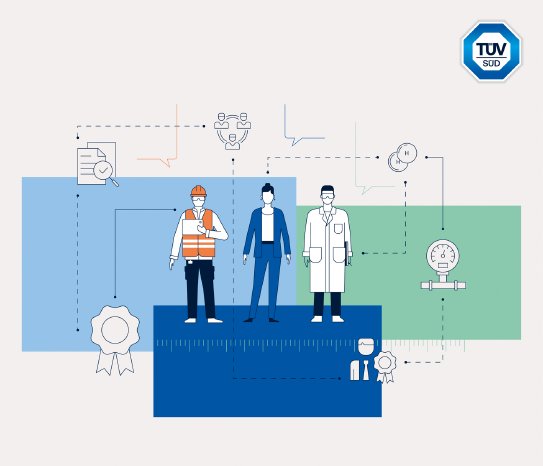Green hydrogen will play a crucial role in global attempts to reduce CO2 as a partial or complete replacement for natural gas. However, this poses complex challenges for manufacturers and operators, who need to ensure their components and systems function reliably and safely both during the conversion process and afterwards for operation with pure hydrogen. Supporting the transition to renewable energies, TÜV SÜD provides an extensive range of testing, inspection, and certification services for hydrogen technologies, including:
Safety and performance tests for hydrogen technologies: TÜV SÜD offers tests across the entire pressure and temperature ranges for hydrogen, helium, and gas mixtures, including performance and durability tests up to 130 MPa, leakage and permeability tests up to 130 MPa, and hydraulic fracture tests up to 400 MPa, as well as pressure vessel leakage and permeation tests up to 105 MPa. Further services offered by the company comprise testing of metallic and non-metallic materials for hydrogen compatibility.
Environmental and EMC testing: TÜV SÜD also offers extensive EMC testing for hydrogen systems and environmental testing in accordance with LV123/124, which is relevant for mobile, stationary, and industrial hydrogen applications such as fuel cell modules, systems, and pressure vessels.
The H2-Readiness certification developed by TÜV SÜD is an innovative process for confirming whether materials and components are suitable for use with hydrogen in the future. In close cooperation with component manufacturers, for example, the experts have developed the P003 standard for verifying the resistance of materials to hydrogen under pressure. A guideline on the H2 readiness of power plants supports operators seeking to convert their combined cycle power plants to operation with hydrogen, and thus helps to accelerate the introduction of this environmentally friendly technology.
Certification for fuel cell system and H2 system components
TÜV SÜD offers voluntary certification programs that can be used by manufacturers of fuel cell systems and H2 system components to demonstrate the high quality and safety of their products. These certificates cover aspects including stationary fuel cell systems for decentralized power generation and hydrogen-carrying components for uses such as H2 filling stations or in hydrogen-powered vehicles.
The corresponding certification programs are designed to comply with various standards, including the IEC 62282 series of standards, ISO 19887 for vehicle components, and ISO 17268 for refueling nozzles and receptacles. This ensures that the products meet the stringent quality and safety requirements that apply in the hydrogen industry.
Training and qualification services on the correct handling of hydrogen
Alongside testing and certification services, TÜV SÜD Academy also offers training courses and qualifications along the hydrogen value chain. Current seminars address topics including “Material compatibility in connection with hydrogen,” “Power-to-gas systems with hydrogen," “Safety and approval of hydrogen drives for rail vehicles,” and “Safer working on systems with hydrogen.” TÜV SÜD Academy will be presenting its range of courses at Hydrogen Technology Expo in Hamburg as well as the hy-fcell trade show in Stuttgart from October 8–9 (Hall 4, Booth 4HZ03).
For more information on TÜV SÜD's services in the field of hydrogen and fuel cell technologies and its training and education services, visit:
• Hydrogen Services for a clean future
• Hydrogen Technology & Fuel Cells
• The Hydrogen Value Chain
• Hydrogen Energy Solutions
• Hydrogen enables the connection of clean energy and applications
• Seminars on the proper handling of hydrogen (in German)


